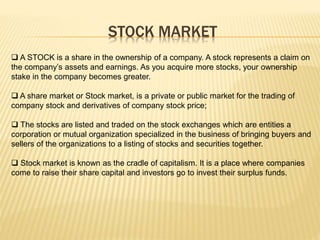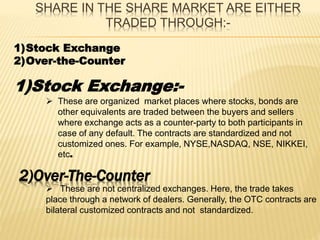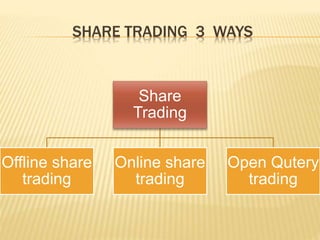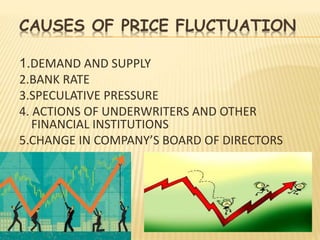Stock market
- 1. STOCK MARKET ïą A STOCK is a share in the ownership of a company. A stock represents a claim on the companyâs assets and earnings. As you acquire more stocks, your ownership stake in the company becomes greater. ïą A share market or Stock market, is a private or public market for the trading of company stock and derivatives of company stock price; ïą The stocks are listed and traded on the stock exchanges which are entities a corporation or mutual organization specialized in the business of bringing buyers and sellers of the organizations to a listing of stocks and securities together. ïą Stock market is known as the cradle of capitalism. It is a place where companies come to raise their share capital and investors go to invest their surplus funds.
- 2. SHARE IN THE SHARE MARKET ARE EITHER TRADED THROUGH:- 1)Stock Exchange 2)Over-the-Counter 1)Stock Exchange:- ï These are organized market places where stocks, bonds are other equivalents are traded between the buyers and sellers where exchange acts as a counter-party to both participants in case of any default. The contracts are standardized and not customized ones. For example, NYSE,NASDAQ, NSE, NIKKEI, etc. 2)Over-The-Counter ï These are not centralized exchanges. Here, the trade takes place through a network of dealers. Generally, the OTC contracts are bilateral customized contracts and not standardized.
- 3. SHARE TRADING 3 WAYS Share Trading Offline share trading Online share trading Open Qutery trading
- 4. SEBI(Securities And Exchange Board of India) 1. Introduction:- ïķ SEBI is the Regulator for the Securities Market in India. Originally set up by the Government of the India in 1988, it acquired statutory from in 1992 with SEBI Act 1992 being passed by the Indian Parliament. Chaired by C B Bhave. 1. Function of SEBI:- I. The issuers of securities II. The Investors III. The market intermediaries
- 5. INDIAN STOCK EXCHANGES 1) BSE (Bombay Stock Exchange):- ï Location: Mumbai ï Index: Sensex (SENSitve indEX) ï Consist of group of 30 Stock ï Members: 852 ï Date of Launch: 03 January 1986 ï Base period:1978-79 ï Base Index Value:100 ï Timing: 09.30 AM â 03.30 PM ï Listed Co. : over 6000
- 6. SENSEX ARCHIVES (1991 â 2009)
- 7. 2)NSE(National Stock Exchanges) ï Location: Mumbai ï Index: Nifty (National Stock Exchange Fifty) ï Consist of group of 50 Stocks ï Date of Launch: April 1994 ï Base period: 1993-94 ï Base index value: 1000 ï Members 726
- 8. Type Of The Market Stock Market Normal Market Auction Market Odd Lot Market Spot Market
- 9. BIG STOCK MARKET ïž NYSE ( New York Stock Exchange) ïž NASDAQ-America ïž Dow Jones ïž S&Pâ 500 ïž Tokyo Stock Exchange ïž London Stock Exchange ïž Bombay Stock Exchange, India ïž National Stock Exchange, India
- 11. IMPORTANT TERMS IN STOCK MARKET AND IN STOCK TRADING Open- The stock price in beginning of Day(i.e. in morning). High - The stock price reached at the highest level in a day. Low - The stock price reached the lowest level in a day. Close - The stock price at which it remains after the end of market timings or the final price of the stock when the market closes for a day. Volume - Volume is nothing but quantity. Bid - The Buying price is called as Bid price. Offer - The selling price is called offer price.
- 12. STOCK MARKET CONDITIONS There are two ways to describe the general conditions of the stock market: 1)BULL MARKET 2)BEAR MARKET Bull Market - A Bull Market indicates the constant upward movement of the stock market. A particular stock that seems to be increasing in value is described to be bullish.
- 13. A BEAR MARKET INDICATES THE CONTINUOUS DOWNWARD MOVEMENT OF THE STOCK MARKET. STOCK THAT SEEMS TO BE DECREASING IN VALUE IS DESCRIBED TO BE BEARISH. STOCK MARKET CONDITIONS BEAR MARKET:-
- 14. IMPORTANT INDICES IN THE WORLD Name of Index Country Weight No. Pf Stock Base Year Base Value S & P CNX Nifty NSEIL, India Market Capitalization 50 1995 1000 SENSEX 30 BSE, India Market Capitalization 30 1978-79 100 NASDAQ 100 NASDAQ , USA Market Capitalization 100 1985 125 FTSE 100 UK Market Capitalization 100 1984 1000 Hang Seng Hong Kong Market Capitalization 33 1964 100 Dow Jones USA Price 30 1928 Nikkei 225 Tokyo Price 225 1949
- 15. BENEFITS OF INVESTING IN SHARES ï Possibility of increase in value of share ï Income from dividends ï Easy liquidity ï Tax benefits on income earned such as exemptions U/s 10(34) for dividends, Sec 54 for calculating STCG & LTCG
- 16. 1.DEMAND AND SUPPLY 2.BANK RATE 3.SPECULATIVE PRESSURE 4. ACTIONS OF UNDERWRITERS AND OTHER FINANCIAL INSTITUTIONS 5.CHANGE IN COMPANYâS BOARD OF DIRECTORS CAUSES OF PRICE FLUCTUATION
- 17. 6. FINANCIAL POSITION OF THE COMPANY 7.TRADE CYCLE 8.POLITICAL FACTORS 9.SYMPATHETIC FLUCTUATIONS 10. OTHER FACTORS: A. EXPECTED MONSOON B. PERSONAL HEALTH OF HEAD OF GOVERNMENT OR CHAIRMAN OF THE COMPANY C. OIL PRICES IN THE INTERNATIONAL MARKET CONTâĶ

















